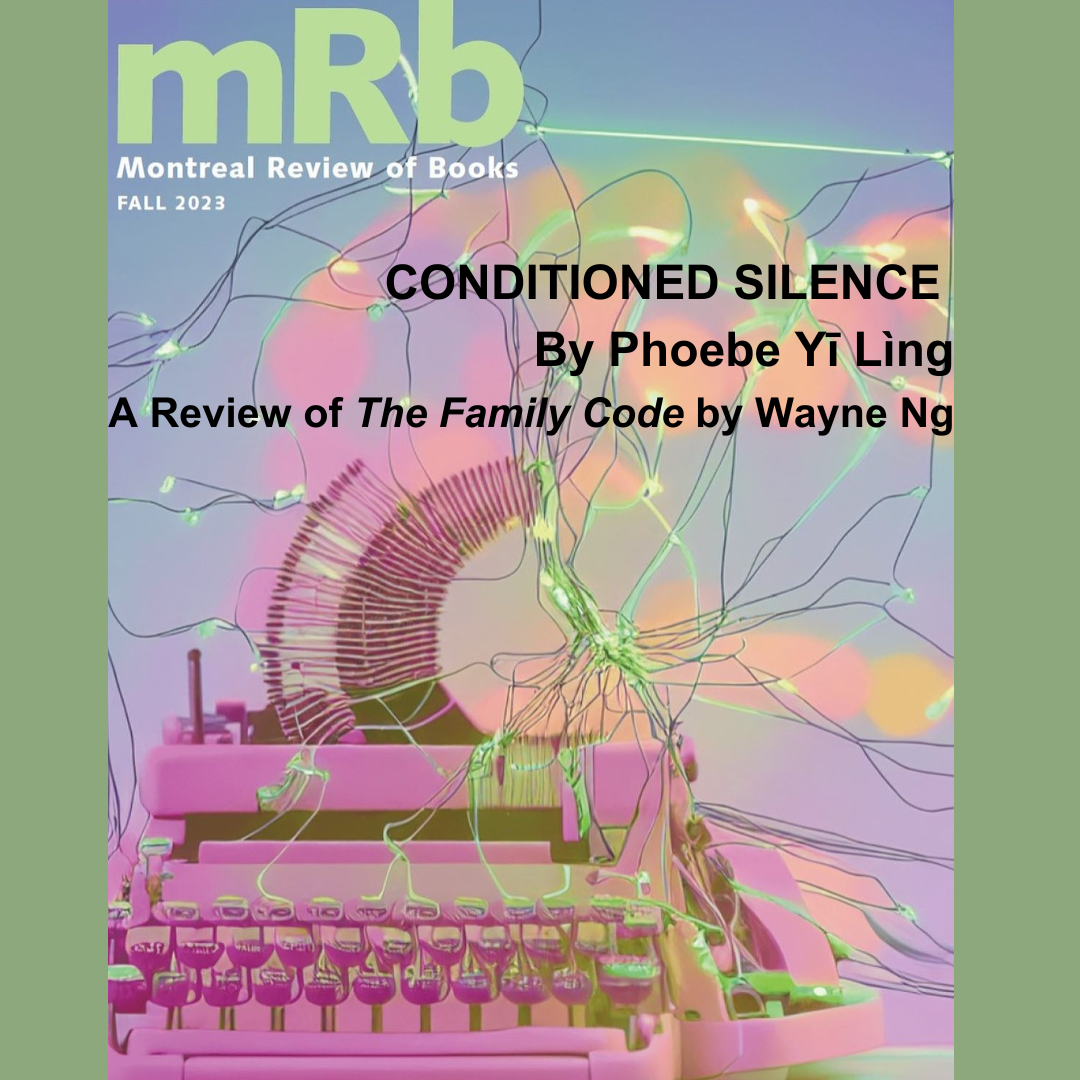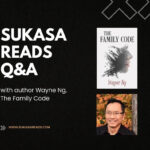Wayne is thrilled that THE FAMILY CODE is in Novembers’ edition of the Montreal Review of Books.
In her review “Conditioned Silence” Phoebe Yī Lìng states:
“If there’s one message that rings clear in Ng’s novel, it’s that as much as our family shapes us, it can also harden us and, at worst, break us.
In The Family Code, Hannah Belenko demonstrates that the darkest parts of herself must be reckoned with in order to come out the other side. From her story, Ng teaches us that family certainly provides us with the fuel for our own growth, although this sometimes means being far from their reach, and unlearning everything we believed about ourselves and the world around us so we can start anew.”
The full review is reproduced below from the Montreal Review of Books‘ website.
Conditioned Silence – By Phoebe Yī Lìng
A review of The Family Code by Wayne Ng
Published on November 1, 2023
Our family is the nucleus around which we as social beings learn to interact with the world. For those of us who are lucky, we’re born into a safe, warm, and loving environment where our physiological and emotional needs are met. For others, there lurks the inherited pain of intergenerational grief, which weaves its way into the family dynamic, tightening its grip, leaving family members caught in a debilitating cycle of fight, flight, or freeze.
In Wayne Ng’s The Family Code, readers are taken on a rough, often disagreeable journey through two years in the life of Hannah Belenko – a self-loathing, reckless single mother of two. Throughout the novel, we’re periodically thrown back into the trenches of Hannah’s upbringing in suburban Ontario as the daughter of a merciless father and a voiceless, enabling mother. Rooted in the belief that family is everything, the Belenko legacy is kept alive through collective silence: regardless of what takes place (the witnessing of her brother’s sexual assault on a teammate, the extreme physical abuse from her father), it’s best kept under wraps.
Soon after losing parental custody of her daughter Faye and suffering from a violent altercation with her then-boyfriend, Hannah decides to escape to Halifax with her son Axel, where she first met her children’s father. Between late-night parties at her run-down basement apartment and finding Axel a school so she can work, Hannah goes about life the only way she knows how. What we understand from the very beginning, however, is that her know-how is steeped in survival – doing whatever it takes just to scrape by.
Almost everyone Hannah encounters on her path either fuels or is consumed by the fires of her personal hell. The more we discover about her past, the more we begin to understand Hannah’s destructive behaviour, which eventually jeopardizes her permanent custody of Axel. If there’s one message that rings clear in Ng’s novel, it’s that as much as our family shapes us, it can also harden us and, at worst, break us.
Skillfully moving between Hannah’s narrative and that of her son, Ng grants us at least some reprieve from the heaviness that weighs on the struggling mother’s life. If readers can’t identify with being the helpless byproduct of their own upbringing through Hannah’s portrayal, this is revealed through young Axel’s eyes. The boy is the victim of his mother’s unpredictability and poor choices, understandably provoking maladaptive, sometimes aggressive behaviour. At his core, all Axel wishes is for safety, warmth, and his mother’s happiness. Although there are several instances in the seven-year-old’s narrative where readers may question the level of self-awareness he expresses, the author’s extensive experience as a social worker may simply challenge our own assumptions about a young child’s ability for self-reflection.
On Hannah’s parental journey, which becomes deeply intertwined with Community Services interventions, it’s clear that she must make a choice: break the conditioned silence that has allowed her to get by for so long, or risk being crushed by the weight of all that the Belenko family code carries with it. With the will and support of a few caring people along the way, readers can only cheer Hannah on as she finally begins to make the right choices for herself and her family. Ng inspires feelings of true pride when readers recognize Hannah’s progress – her attendance at support groups, the efforts made to keep a tidier home, ensuring food is on the table, and the routine maintained during Axel’s overnight visits.
In The Family Code, Hannah Belenko demonstrates that the darkest parts of herself must be reckoned with in order to come out the other side. From her story, Ng teaches us that family certainly provides us with the fuel for our own growth, although this sometimes means being far from their reach, and unlearning everything we believed about ourselves and the world around us so we can start anew.
Phoebe Yī Lìng is a freelance writer, editor, and full-time explorer. She currently works with the Nunavik Inuit community as a Gladue writer and sometimes spends her time dabbling in experimental performance or marvelling at the complexities of intra/interpersonal communication.
Buy your copy of THE FAMILY CODE now!


